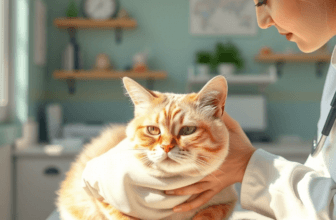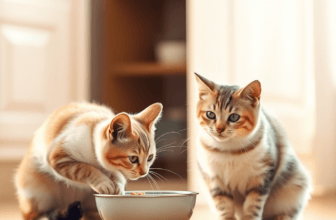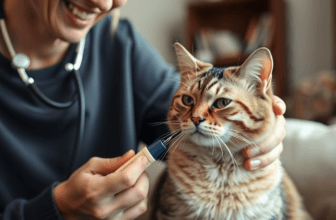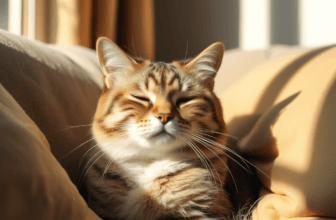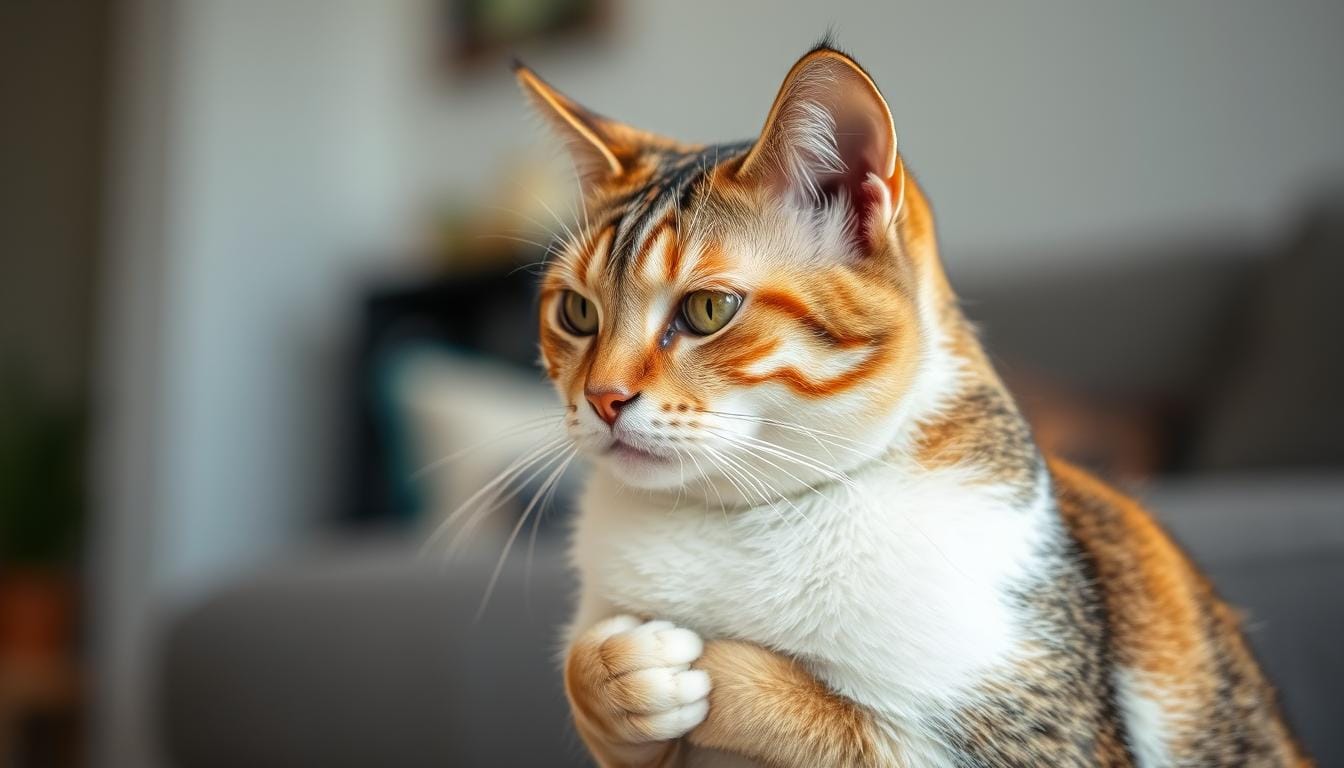
Table of Contents
Ever think about what’s happening in your aging cat’s brain? As they get older, their brain changes in ways you might find surprising.
Cognitive dysfunction syndrome (CDS) is a big problem for many senior cats. Studies show that over 55% of cats between 11 and 15 years old start to show cognitive changes. This number jumps to more than 80% for cats between 16 and 20 years old.
It’s important to understand these changes to care for your aging cat well. Senior cats’ brains and memories change, affecting how they see the world. These changes can be small but still impact their daily life a lot.
This guide will dive into the world of feline cognitive health. You’ll learn how to spot, understand, and support your senior cat’s aging brain. We’ll cover memory changes and behavioral shifts, giving you a deeper look into your cat’s mental journey.
Understanding Cognitive Decline in Aging Cats
As your feline friend gets older, it’s key to understand cognitive decline. Senior cats face brain changes that affect their mental health and daily life.
Cats age similarly to humans, with brain aging starting around 10 years old. These changes are small at first but grow more obvious with age.
Early Signs of Mental Changes
Spotting the first signs of cognitive decline is vital for cat owners. Look out for these early signs:
- Increased confusion or disorientation
- Changes in sleep patterns
- Reduced interaction with family members
- Decreased responsiveness to familiar commands
- Altered vocalization patterns
Age-Related Brain Changes
The aging brain undergoes many changes. These include less neural connection, fewer neurotransmitters, and brain shrinkage in areas for memory and processing.
Impact on Daily Functions
Cognitive decline affects your cat’s daily tasks. You might see them struggle with simple things like:
- Using the litter box consistently
- Recognizing familiar family members
- Maintaining regular eating and sleeping schedules
- Navigating familiar home environments
Understanding these changes helps you provide compassionate support during your cat’s aging journey.
When Does Cognitive Decline Begin in Cats
It’s important for cat owners to know when cognitive decline starts. Studies show that brain changes can begin early, even before symptoms are clear. Cats may start showing signs of cognitive decline around 10-11 years old. But, brain changes can start as early as 6-7 years old.
As cats get older, it’s crucial to watch their brain health closely. Veterinarians have found important stages in a cat’s brain development. These stages affect how well your cat thinks and learns:
- Early neurological changes: 6-7 years
- Subtle cognitive shifts: 8-9 years
- Noticeable cognitive decline: 10-11 years
Changes in your cat’s brain happen slowly. The caudate nucleus, a key part of the brain, starts to change early in a cat’s senior years. This area is important for learning and memory.
| Cat Age Range | Cognitive Status | Typical Observations |
|---|---|---|
| 6-7 years | Early Neurological Changes | Subtle brain function alterations |
| 8-9 years | Initial Cognitive Shifts | Minor behavioral modifications |
| 10-11 years | Noticeable Cognitive Decline | Significant mental function changes |
Spotting these early signs is key to helping your aging cat. Regular vet visits and watching your cat closely are essential. This way, you can support your cat’s brain health.
Senior Cat Memory: Signs and Symptoms
As your cat gets older, they might start to forget things. It’s important to notice these changes to help them feel better.
Memory loss in cats shows up in different ways. Spotting these signs early can really help your cat’s health and happiness.
Memory Loss Indicators
Senior cats may show several signs of memory loss:
- Getting lost in familiar spaces
- Difficulty recognizing family members
- Forgetting previously learned routines
- Reduced responsiveness to known commands
Behavioral Changes
Behavioral changes in cats can be small but important. Look out for these signs of cognitive decline:
- Increased nighttime vocalization
- Disrupted sleep patterns
- Decreased grooming habits
- Unexpected aggression or anxiety
Social Interaction Changes
Cognitive decline can affect how your cat interacts with others. You might see:
- Reduced interaction with family members
- Withdrawn behavior from other pets
- Less interest in playing or cuddling
- Seeming disconnected or confused during interactions
Spotting these signs early can help you adjust your care and improve your senior cat’s life.
The Science Behind Feline Brain Aging
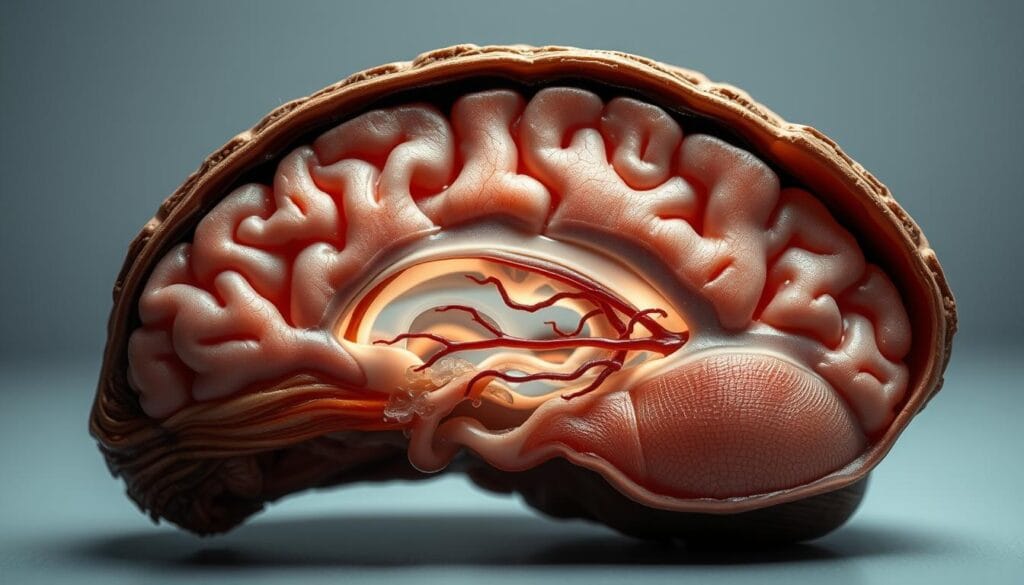
Exploring feline neurology opens up interesting facts about how cats’ brains age. As cats get older, their brains change a lot. These changes affect how well they think and remember things.
Studies have found important changes in older cat brains. These changes lead to a decline in thinking skills:
- Cerebral atrophy (brain tissue shrinkage)
- Increased ventricular size
- Widening of brain sulci (cortical grooves)
- Reduced neural connectivity
The aging process in cats’ brains is complex. Neurons work less well, and the brain makes fewer neurotransmitters. The brain’s chemistry also changes a lot. These changes can cause cats to act differently, forget things, and think less clearly.
Research in feline neurology shows that these brain changes are natural but vary among cats. Things like genetics, diet, and health affect how much and how fast these changes happen.
“Understanding brain aging helps cat owners provide better care for their senior companions.”
Even in old age, a cat’s brain keeps adapting to new things. Knowing about these changes can help you support your cat’s brain health and happiness as they get older.
Common Behavioral Changes in Senior Cats
As cats get older, their behavior changes a lot. Knowing these changes helps you care for your aging cat better. Senior cat behavior can be tricky because their minds work differently.
Cats show many behavioral changes as they age. These changes can be small or big, depending on their health and surroundings.
Disorientation Patterns
Senior cats often get lost in familiar places. You might see your cat:
- Becoming lost in familiar spaces
- Staring blankly at walls or corners
- Appearing confused about room locations
- Wandering aimlessly around the house
Changes in Feline Sleep Patterns
Senior cats sleep differently. They might:
| Sleep Behavior | Typical Changes |
|---|---|
| Nighttime Activity | Increased restlessness and vocalization |
| Daytime Sleeping | Longer and more frequent naps |
| Sleep Cycle Disruption | Irregular sleep-wake patterns |
Altered Social Behaviors
Older cats may act differently around others. Look out for these signs:
- Increased irritability with other pets
- Reduced tolerance for handling
- Heightened dependency on human companions
- Decreased interest in play or interaction
Spotting these changes early lets you adjust your care. This helps your senior cat live better.
Physical Changes in the Aging Feline Brain
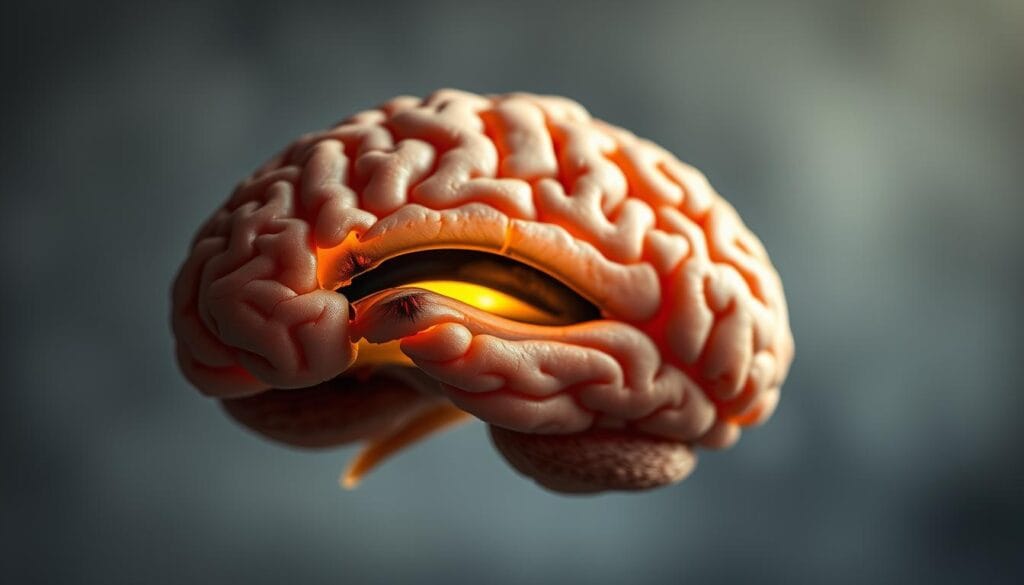
As cats get older, their brains change a lot. These changes affect how they think and act. Senior cats might not process information as well as they used to.
The aging brain goes through several changes:
- Reduction in neural density
- Decreased synaptic connections
- Slower neurotransmitter production
- Shrinkage of brain tissue
Studies have found changes in older cats’ brains. Purkinje cells, important for movement and learning, decrease in number and function.
| Brain Region | Age-Related Changes | Potential Impact |
|---|---|---|
| Cerebral Cortex | Neuron loss | Reduced cognitive flexibility |
| Hippocampus | Decreased neurogenesis | Memory impairment |
| Cerebellum | Reduced Purkinje cells | Motor skill degradation |
Knowing about these changes helps cat owners meet their pet’s needs. It ensures a good life for them in their older years.
Distinguishing Normal Aging from Cognitive Dysfunction
As your cat gets older, it’s key to know the difference between normal aging and cognitive dysfunction. Not every change in behavior is a big deal. But some signs need more attention.
Normal aging in cats means they might sleep more and move slower. They might also show less interest in play. These changes are just part of getting older.
Key Differences to Watch For
Spotting signs of cognitive dysfunction in cats involves looking at certain behaviors:
- Disorientation that’s more than just being slow
- Big changes in how they interact with others
- Changes in when they sleep and wake
- Constant meowing without a reason
- Big changes in how they use the litter box
When to Seek Veterinary Help
Your vet can tell if your cat is just getting older or if they have cognitive dysfunction. You should get a vet check if you see:
- More and more confusion
- Not wanting to interact with family
- Being restless at night
- Big changes in their personality
“Early detection can significantly improve your cat’s quality of life and management of cognitive changes.” – Veterinary Neurology Experts
While some changes are normal, feline cognitive dysfunction is a bigger deal. It needs a vet’s check and might need treatment.
Environmental Impacts on Cognitive Health
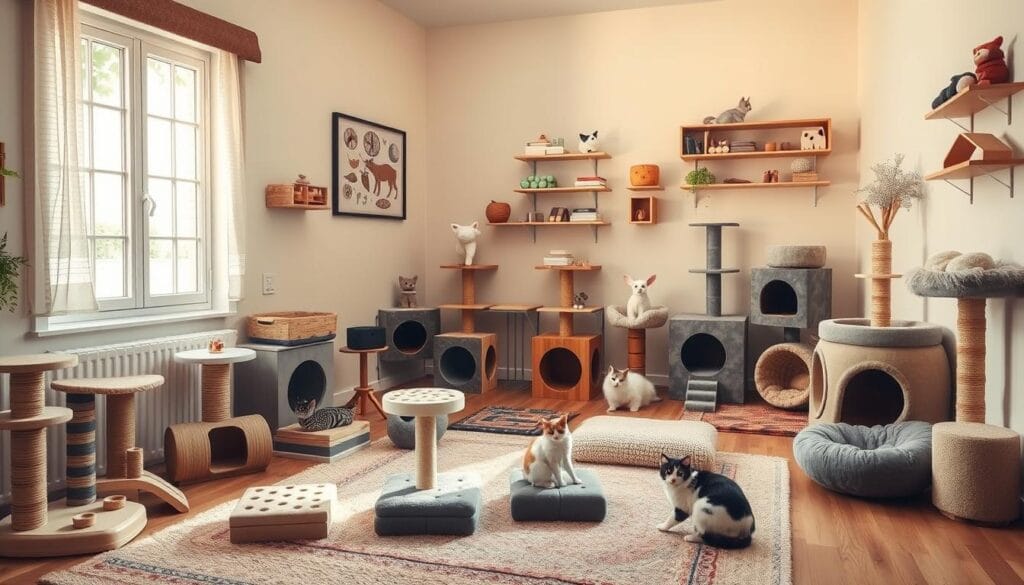
Your senior cat’s environment is key to keeping their mind sharp. As cats get older, their brains need extra help to stay alert. This helps slow down mental decline.
Creating a stimulating space can greatly benefit your aging cat’s brain. Using enrichment techniques can significantly improve their cognitive abilities.
- Introduce puzzle feeders that challenge mental problem-solving skills
- Rotate interactive toys to maintain novelty and interest
- Create safe indoor climbing spaces
- Use sensory stimulation tools like gentle sound machines
Stimulating your cat’s mind doesn’t have to be hard. Small changes in their daily life can offer a lot of mental stimulation.
| Environmental Enrichment Strategy | Cognitive Benefits |
|---|---|
| Interactive Puzzle Toys | Improves problem-solving skills |
| Window Perches | Provides mental stimulation through visual engagement |
| Gentle Training Sessions | Maintains neural connections |
“A mentally stimulated cat is a healthier, happier companion.” – Veterinary Neurologists
Every cat is different. Watch how your pet reacts and tweak their environment to keep them engaged.
Nutrition and Brain Health in Senior Cats
Keeping your senior cat’s brain healthy needs a smart plan for their diet. As cats get older, their food needs change a lot. A special diet for brain health can really help their mental health and life quality.
Good food is key for your aging cat’s brain. The right food can slow down brain aging and give important nutrients for brain work.
Essential Nutrients for Brain Function
Important nutrients for your cat’s brain health include:
- Omega-3 fatty acids: Important for brain signals
- Antioxidants: Fight off age-related damage
- Vitamin E: Protects the nervous system
- B-complex vitamins: Key for brain function
Dietary Recommendations for Cognitive Support
When picking a diet for your senior cat’s brain, think about these tips:
- Go for senior cat foods with extra brain support
- Add supplements your vet suggests
- Choose high-quality proteins
- Keep meal times regular
Talking to a vet nutritionist can help make a diet plan that fits your senior cat’s brain health needs.
Managing Daily Care for Cats with Cognitive Decline
Caring for a senior cat with cognitive decline needs patience and understanding. Your approach to care can greatly improve your cat’s life during this tough time.
Creating a supportive environment is key for cognitive support. Start by keeping daily routines consistent. This helps your cat feel secure and less anxious. As your cat’s mental abilities change, predictability becomes more important.
- Keep feeding times and locations consistent
- Maintain familiar sleeping areas
- Use nightlights to help with navigation
- Place litter boxes in easily accessible locations
Mental stimulation is still vital for senior cats. Engage your cat with gentle toys, short play, and quiet company. Soft puzzle feeders and low-intensity games can help keep their mind sharp.
Physical comfort is also crucial. Make sure your cat has cozy resting spots, orthopedic bedding, and easy access to important areas. Using ramps or steps can help your cat reach favorite spots more easily.
Regular vet visits are key for watching cognitive changes and adjusting care. Your vet can give personalized advice for managing your cat’s specific challenges.
Treatment Options and Interventions
Senior cats face cognitive challenges that need a full plan. Your vet can create a custom plan. This plan will mix medical help and behavior therapy for your cat.
There are many ways to manage cognitive issues in cats. These methods aim to improve their life and slow down mental decline.
Medical Treatments for Cognitive Support
Veterinary medicine has several options for cats with cognitive problems:
- Selegiline hydrochloride to boost brain function
- Anti-anxiety meds to lessen stress
- Supplements for better brain health
“Early intervention can significantly improve your cat’s cognitive functioning and overall well-being.” – Veterinary Neurology Experts
Behavior Therapy Strategies
Behavior therapy is key in managing cognitive decline. Focus on making a supportive environment. This environment should reduce confusion and anxiety.
- Keep daily routines consistent
- Make spaces calm and predictable
- Use gentle brain games
- Make living areas easy to navigate
Personalized behavior therapy can help your senior cat adapt to cognitive changes while maintaining dignity and comfort.
Working with your vet is important for a complete approach to feline cognitive treatments. Every cat’s journey is different. They need patience and special care.
Preventive Measures for Cognitive Health
Keeping your senior cat’s mind sharp is crucial. Prevention is key to slowing down mental decline. By taking action early, you can support your cat’s brain health as they age.
Mental challenges are vital for your cat’s brain. Activities that test their mind are essential. Here are some ways to keep their mind sharp:
- Interactive puzzle toys that encourage problem-solving
- Regular play sessions with varied toys
- Training exercises that teach new skills
- Rotating toy collections to maintain novelty
Physical activity is also important for their brain. Short, gentle play helps keep their brain active. Make sure to play with your cat every day to keep them both mentally and physically fit.
What your cat eats is also crucial. Senior cat food with antioxidants and omega-3s supports brain health. Talk to your vet about supplements for extra brain support.
Early intervention and consistent mental engagement are your best tools in preserving your senior cat’s cognitive abilities.
Regular vet visits are important for catching early signs of brain changes. Your vet can suggest specific steps to help your cat based on their health.
Supporting Your Cat Through Cognitive Changes
Watching your cat go through cognitive changes can be tough. It’s important to offer support during this time. Senior cats need extra care and love as they age.
To help your cat, create a supportive space. Your patience and understanding can greatly improve their life.
- Create a consistent daily routine
- Maintain a calm and predictable home environment
- Use gentle communication and reassurance
- Minimize sudden changes or disruptions
When your cat’s mind starts to decline, talking softly is key. Keep eye contact and use gentle touches. This helps your cat feel connected and understood.
| Support Strategy | Benefit |
|---|---|
| Quiet safe spaces | Reduces anxiety and stress |
| Regular veterinary check-ups | Monitors cognitive health progression |
| Mental stimulation activities | Helps maintain cognitive function |
Every cat’s experience with cognitive changes is different. Your love and support can be a big comfort during this tough time.
Conclusion
Understanding how senior cats change is key for pet owners. Taking good care of your senior cat can greatly improve their life. Spotting early signs of cognitive decline and using strategies to manage it can help a lot.
Getting help from your vet is very important for your cat’s brain health. Regular vet visits, special food, and certain treatments can help slow down brain decline. This way, you can keep your cat’s mind sharp and happy.
Every senior cat is different, and being patient is crucial. Making your home cat-friendly, keeping routines, and being gentle can help your cat adjust to age-related changes. Your love and care can turn challenges into chances for a closer bond.
Cognitive changes don’t mean your cat is less valuable or can’t be happy. With the right care, love, and vet help, many senior cats live happy, engaging lives. Your efforts can make a big difference in your cat’s later years.
FAQ
At what age do cats typically start experiencing cognitive decline?
Cats may show early signs of cognitive changes around 10-11 years old. Noticeable symptoms of cognitive dysfunction syndrome (CDS) become more common in cats over 11 years of age.
What are the first signs of cognitive decline in senior cats?
Early signs include disorientation and changes in sleep patterns. Cats may also show altered social interactions and decreased responsiveness to familiar people or pets. They might also change learned behaviors like litter box use or feeding routines.
Can cognitive decline in cats be prevented?
While complete prevention isn’t possible, you can support your cat’s cognitive health. This includes mental stimulation, proper nutrition, regular vet visits, environmental enrichment, and keeping them physically active.
How does nutrition impact a senior cat’s cognitive function?
Nutrients like omega-3 fatty acids and antioxidants support brain health. Specialized senior cat diets and supplements can slow cognitive decline and support neurological function.
When should I consult a veterinarian about my cat’s cognitive changes?
Seek vet advice for persistent behavioral changes, significant disorientation, or dramatic shifts in sleep patterns. Also, if symptoms start to impact your cat’s quality of life or daily functioning.
Are there treatments available for feline cognitive dysfunction?
Treatments include medical interventions, behavioral modifications, and environmental adaptations. Nutritional support and medications can also help manage symptoms and slow cognitive decline.
How can I help my senior cat maintain mental stimulation?
Use interactive toys, puzzle feeders, and gentle play sessions. Create safe exploration areas and maintain consistent routines. Offer gentle mental challenges that match your cat’s abilities.
Is cognitive decline the same as normal aging in cats?
Some cognitive changes are normal with aging. However, cognitive dysfunction syndrome represents a more significant decline. It substantially impacts a cat’s daily functioning.
Can a cat’s environment influence cognitive health?
Yes, a stimulating and consistent environment supports cognitive function. Minimizing stress, providing mental challenges, and maintaining familiar routines can help preserve cognitive abilities.
What physical brain changes occur during feline cognitive decline?
Age-related changes include neuronal loss and reduced brain volume (cerebral atrophy). There are also alterations in neurotransmitter function and decreased neural connectivity. These changes contribute to cognitive and behavioral changes.



